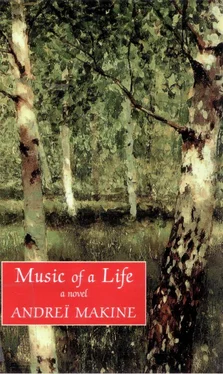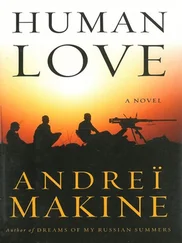As his hands fell upon the keyboard, it was still possible to believe a beautiful harmony had been formed at random, in spite of him. But a second later the music came surging out, the power of it sweeping away all doubts, voices, sounds, wiping away the fixed grins and exchanged glances, pushing back the walls, dispersing the light of the reception room out into the nocturnal immensity of the sky beyond the windows.
He did not feel as if he were playing. He was advancing through a night, breathing in its delicate transparency, made up as it was of an infinite number of facets of ice, of leaves, of wind. He no longer felt any pain. No fear about what would happen. No anguish or remorse. The night through which he was advancing expressed this pain, this fear, and the irremediable shattering of the past, but this had all become music and now only existed through its beauty.
In the dim light of a winter's morning the train seems to be feeling its way as it approaches Moscow among the clusters of tracks that twist and turn beneath the snow. Berg's concluding words mingle with the heavy jolting of the wheels, the voices and footfalls of passengers in the corridor. Knocked off balance by this arrival, which we had given up hoping for, the narrative hesitates and is then polished off in a few hurried sentences: the years spent in a camp ("I didn't even benefit from the amnesty when Stalin died. I did my ten years, through to the last day"); then his visits to Moscow (in the hope of seeing Stella again? He does not say, no longer has time to say), clandestine visits, for he had been directed to live in a small town in eastern Siberia; a further arrest in the course of one of these trips to the capital; three years served close to the arctic circle, where he realized that he had finally become accustomed to that snow hell… It was there, under the sunless sky, that he would learn the year and place of his parents' death.
The train stops. We take our first steps as if weightless – after days and nights of immobility, our feet plant themselves in the snow with the suppleness of a dance. In the frozen air the aggressive acidity of a big city stings the nostrils. Side by side with Berg, I walk along a dim, endless platform. The passengers stepping down from our train pause for a moment, irresolute, like sleepwalkers. In some of them one can sense a longing to sit down on a suitcase, curl up, and go to sleep again. Berg goes ahead of me; I see him slipping along through the drowsy crowd as it shuffles toward the station. For a second he becomes a passenger like the others, a provincial landing in Moscow at six o'clock in the morning. I watch him walking along and think of him arriving like this in the capital, in the old days, secretly, eager to melt into the crowd. I remember the end of his story: how Moscow was more dangerous than the depths of the taiga, how Vera, the general's old housekeeper, who once used to bring him tea in the crow's nest, now gave him news of Stella's life.
Presented differently, all these missed encounters could have added up to a fine, tragic story. But they had been recounted helter-skelter amid the sounds of a train arriving in a great, dark, frozen city. And that was doubtless how they had been lived through, in the disconcerting simplicity with which broken lives are lived.
We enter the immoderately lofty station hall, and in the midst of this emptiness, where it seems as if nothing personal can be said, Berg confides to me, without turning his head, "Her husband had some problems at work at the time of de-Stalinization. He began drinking, left her… She died at the beginning of the sixties, from cancer. Their son was seven. I did what I could, through the intermediary of a friend. A little money each month. I stayed up in the north. A job for madmen at fifty below zero. 'Twelve months of winter, the rest is summer,' as they say up there. But the pay was very good. Only the child wasn't to know. They still had me on file as a repeat offender."
He looks at me with a smile, holds out his hand: "Well, then, safe journey, and no hard feelings."
I shake his hand, I see him moving away. Three Stations Square is gloomy at this hour. The streetlights slice it up into bluish sections. The big trucks shake its frozen shell with their steely roar. The people hurrying along, wearing coats of coarse gray or black, look like something out of Stalin's time, the years of war, privations, silent heroism. Berg melts into this human tide, heads toward a subway station, is lost in the dark current pouring into the entrance. He has the same stiff gait, the same stoic determination. I manage to spot him in the crowd at the top of the staircase, then he disappears. Homo sovieticus, a slightly scornful voice murmurs within me. I am too sleepy to silence it.
I return to the station hall. The hours of departure advertised on the board have a surreal air after our delay, after all those time zones I have crossed since the Far East, and above all, after the time past inscribed in me by Berg's story. But the strangest thing of all is that Berg suddenly reappears. Yes, he is there in front of me; it is not a dream.
"I went off without asking you if you had a place to stay in Moscow. I hope you're not going to stand here at the station all day."
I tell him I won't be leaving until the last train, at about midnight, and that I'm planning to go and see a museum, and before that I'll go to the early show of some movie, to sleep. He smiles; this plan of going to sleep in the movies (ten kopecks for a show, an empty auditorium, and a nice warm seat) must remind him of his own past as a wanderer.
"Let me give you the advice of an old Muscovite." His voice cannot conceal a secret delight. "You know, you're as likely to find a hotel room in Moscow as you are to get a bed for the night in the Lenin Mausoleum. But I have an old friend, a recidivist like me – "
He guides me across the city, by subway, by bus, then on foot, taking shortcuts through courtyards, always with a touch of cheerful brusqueness, happy to be back on familiar territory, to show off his knowledge of the capital. I follow him with resignation, like a child walking along half asleep.
At the hotel, weariness overwhelms me. I wake up for a moment in the middle of the day, an unreal vision presents itself to my eyes: stretched out on Berg's bed is a dark suit. It looks like a man squashed flat, emptied of his substance; a necktie hangs over the back of the chair, a strong smell of eau de cologne comes from the bathroom. Not having the strength to seek an explanation, I go straight back to sleep.
When Berg wakes me up, I don't recognize him immediately. He has put on the suit that was laid out on his bed, and the tie. His hair is sleek and glossy.
"I didn't want to disturb you before, you were sleeping so soundly… But it's already six."
On the table I see two glasses in which tea is steeping, an immersion heater hooked onto the window latch.
"Are you going… to the theater?" I say, trying not to betray my surprise at the change.
"Yes – in a manner of speaking. Well, to a concert. And by the way, I thought that if you were interested…"
We drink the lemon tea and eat bread, the same as had been wrapped in pages of sheet music, and some slices of salami. After the meal I wash up, comb my hair. Berg lends me a tie.
"We are the first to arrive. The concert hall, at the other end of Moscow, belongs to the state railroads' house of culture.
We remain for a long time in a cold, ill-lit entrance hall. Berg, invisible, silent on a bench in a corner, I pacing up and down past walls decorated with photos of locomotives, from the most ancient squat ones, with their smokestacks comically bell shaped, to the most modern. I also glance into the auditorium. It seems too vast to me; a concert is never going to attract enough people to fill it, especially in this district, miles from anywhere! Nevertheless people begin flocking in, at first hesitantly, like ourselves, then, as their number grows, producing that slight electricity of whispering, anticipation, excitement, that occurs before any performance. Once seated, they spread an agreeable tension through the auditorium. The magic of the theater! I say to myself. Who cares about the hall, or the stage, or what's going to happen onstage? The main thing is that something's going to happen.
Читать дальше












